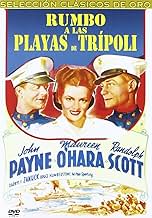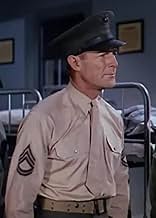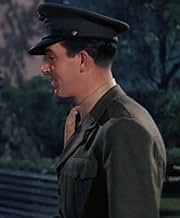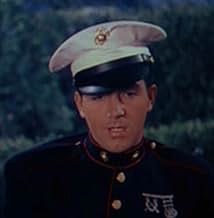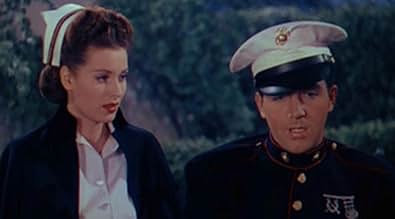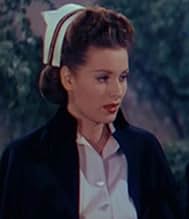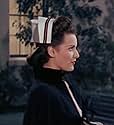CALIFICACIÓN DE IMDb
5.9/10
1 k
TU CALIFICACIÓN
Un hombre que es todo un Don Juan se alista a la marina y pondrá a prueba la paciencia del veterano coronel.Un hombre que es todo un Don Juan se alista a la marina y pondrá a prueba la paciencia del veterano coronel.Un hombre que es todo un Don Juan se alista a la marina y pondrá a prueba la paciencia del veterano coronel.
- Dirección
- Guionistas
- Elenco
- Nominado a 1 premio Óscar
- 1 premio ganado y 1 nominación en total
Harry Morgan
- Mouthy
- (as Henry Morgan)
Joseph Crehan
- Uncle Bob
- (escenas eliminadas)
John Hamilton
- Gen. Gordon
- (escenas eliminadas)
Iris Adrian
- Okay's Girlfriend
- (sin créditos)
Stanley Andrews
- Doctor
- (sin créditos)
Hugh Beaumont
- Orderly
- (sin créditos)
- Dirección
- Guionistas
- Todo el elenco y el equipo
- Producción, taquilla y más en IMDbPro
Opiniones destacadas
Stepping into the hero/heel part that Tyrone Power specialized in while at 20th Century Fox is John Payne as the spoiled kid of a former Marine officer, Minor Watson. Payne's hoping to get out of the Marines for a nice desk job in Washington, DC, but Watson's hoping that his former sergeant Randolph Scott, now a drill instructor will give Payne the necessary attitude adjustment.
Payne's getting an attitude adjustment in another direction too. He's fallen for pretty nurse Maureen O'Hara even though he's got Washington society girl Nancy Kelly pulling strings for him.
The part is such a perfect one for Tyrone Power that I'm sure it was offered to him and rejected and given to Payne who was hired by Darryl Zanuck because of his resemblance to Power and the fact he could sing opposite Alice Faye and Betty Grable. Power did similar roles in A Yank in the Raf and Crash Dive and in fact did serve in the Marines in the South Pacific after 1943.
The film was shot on location at the San Diego Marine training station and I visited San Diego a few years back and some of it looks pretty much the same. Harry Morgan made his feature film debut and if you look close you'll see that another one of the Marine recruits is the Skipper himself, Alan Hale, Jr.
To the Shores of Tripoli is badly dated and doesn't play real well against today's attitudes. Still it's a great example of a World War II propaganda piece.
Payne's getting an attitude adjustment in another direction too. He's fallen for pretty nurse Maureen O'Hara even though he's got Washington society girl Nancy Kelly pulling strings for him.
The part is such a perfect one for Tyrone Power that I'm sure it was offered to him and rejected and given to Payne who was hired by Darryl Zanuck because of his resemblance to Power and the fact he could sing opposite Alice Faye and Betty Grable. Power did similar roles in A Yank in the Raf and Crash Dive and in fact did serve in the Marines in the South Pacific after 1943.
The film was shot on location at the San Diego Marine training station and I visited San Diego a few years back and some of it looks pretty much the same. Harry Morgan made his feature film debut and if you look close you'll see that another one of the Marine recruits is the Skipper himself, Alan Hale, Jr.
To the Shores of Tripoli is badly dated and doesn't play real well against today's attitudes. Still it's a great example of a World War II propaganda piece.
After watching this movie, I now know where the "Officer and a Gentleman" screen writers probably got their idea for the character Sgt. Foley. Randolph Scott was the Sgt. Foley of the 1940s. This movie was made during World War Two, but it spares us the jingoistic propaganda associated with most war movies of that era and offers interesting and likable characters, especially Maureen O'Hara as a Navy nurse and John Payne as the recruit. While watching this movie I thought of Richard Gere and how he would have fit in well in this movie. The similarities between this movie and "Officer" must be more than just coincidental. "Officer" was more intense but this movie did not need to rely on such theatrics to maintain audience interest because the star of this movie was the USMC itself.
To the Shores of Tripoli is the kind of movie that I generally don't care for. The title may conjure images of Marines fighting and dying on some foreign shore, but you won't find that here. Instead you'll find a flag-waving recruitment film that makes Marine basic training look like a trip to summer camp. The movie makes it seem that the entire eight week training is made up of little more than marching and doing drills in a parking lot. And when these guys aren't in the parking lot, they're pulling pranks and wooing nurses they've been told to leave alone. Abbott and Costello's Buck Privates has more in the way of military realism than To the Shores of Tripoli.
Yet despite all its shortcomings, forced patriotism, and light as air plot, I enjoyed To the Shores of Tripoli. I was somehow able to put my brain on hold and go along for the ride. It's harmless, good-natured fun. Most of my enjoyment probably comes from the three main leads. John Payne, Maureen O'Hara, and Randolph Scott do a solid job with what they're given to work with. Much of the comedy works, particularly the hospital scene where Payne fakes an injury to be near O'Hara. And, To the Shores of Tripoli has an innocence to it that you don't find in movies anymore that I find appealing.
Yet despite all its shortcomings, forced patriotism, and light as air plot, I enjoyed To the Shores of Tripoli. I was somehow able to put my brain on hold and go along for the ride. It's harmless, good-natured fun. Most of my enjoyment probably comes from the three main leads. John Payne, Maureen O'Hara, and Randolph Scott do a solid job with what they're given to work with. Much of the comedy works, particularly the hospital scene where Payne fakes an injury to be near O'Hara. And, To the Shores of Tripoli has an innocence to it that you don't find in movies anymore that I find appealing.
I agree with the evaluation of bsmith5552 that it is a disappointing flagwaver, and essentially a U.S.Marine recruitment film. But it has its own place in history. I have just been refreshed as to that place in history by watching again the film version of Leon Uris's first (and maybe best) novel, Battle Cry. Uris dramatized his own experience as a young marine, first training in the States, then in Wellington and elsewhere in New Zealand and finally fighting in the islands of the Pacific He has a fascinating picture of what it was like for young Americans to find themselves in a strange and previously unheard of land like New Zealand. I was a Kiwi teenager in Wellington at that time and can vouch for the accuracy of Uris' depiction of the impact of the descent of thousands of young marines on our city and of their interaction with the locals. To the Shores of Tripoli screened in Wellington in 1942, not long after Pearl Harbor, in the time the newly formed Marine Divisions were there preparing for their involvement in the war in the South Pacific. Through that film we saw on our screens the training only months earlier of the men who were now in our midst. Bsmith5552 speaks of the repetitive sequences of close order drill. I watched the marine band perform those intricate marching exercises in colour film in a local cinema ("picture theatre" in our brand of English). This was the same week I saw them do it live in Wellington. I was transfixed as I saw utterly committed young marines rise and stand to attention in their places in the cinema as the Marines Hymn came through on the film's sound track. I was not simply present at a piece of entertainment. I was watching live drama. To the Shores of Tripoli may not have been a great movie. But in the South Pacific in 1942, when we (maybe unlike today's Iraquis) welcomed the Marines as life savers, preserving us from a Japanese invasion, it had its place in the drama of that time. I viewed it sixty years ago with great interest. I would like the little niche it has in cinema history to be remembered.
This plot of this film- selfish rich boy joins the armed forces and by turns is converted into a red-blooded selfless team player- is often called cliche'. However, you have to bear in mind that it wasn't at the time it was made; It was one of the genre of plots that became cliche' latter (In fact, it is basically a color remake of "I Wanted Wings"...a much better film IMHO... substituting the Marines for the Air Corps.)
But what it does have is a great cast, great production values and the distinction of the first pairing the lovely Maureen O'Hara, stunning in beautiful early Technicolor, and John Payne. Arguably this is one of the great, if minor, pairings of the 40's ("Sentimental Journey", "Miracle on 34th Street", etc.) that culminated in a return to the Marine/Tripoli theme: In 1950 the pair would almost single-handedly capture the city in "Tripoli".
Is it great cinema? Nah...but it's a fun picture to watch for buffs.
But what it does have is a great cast, great production values and the distinction of the first pairing the lovely Maureen O'Hara, stunning in beautiful early Technicolor, and John Payne. Arguably this is one of the great, if minor, pairings of the 40's ("Sentimental Journey", "Miracle on 34th Street", etc.) that culminated in a return to the Marine/Tripoli theme: In 1950 the pair would almost single-handedly capture the city in "Tripoli".
Is it great cinema? Nah...but it's a fun picture to watch for buffs.
¿Sabías que…?
- TriviaMaureen O'Haras' first film in Technicolor. She looked so good in it that she later earned the nickname "Queen of Technicolor".
- ErroresIn several instances Chris Winters (John Payne) and Sgt. Smith (Randolph Scott) are shown flicking lit cigarettes away, or grinding them into the ground. This would never be allowed as Marines were taught to field strip cigarettes, spreading the ashes and tobacco and rolling the paper into a tiny ball.
- Citas
Sgt. Dixie Smith: Good morning, Roberts.
Corporal: Good morning, Sergeant. You're up kind of early.
Sgt. Dixie Smith: Yeah, I'm expecting a guest.
Corporal: Don't tell me Cagney's coming down here to glorify the Marines again.
- ConexionesEdited into All This and World War II (1976)
- Bandas sonorasI Know Why (and So Do You)
(uncredited)
Music by Harry Warren
Played at the first dance and at various times throughout the picture
Selecciones populares
Inicia sesión para calificar y agrega a la lista de videos para obtener recomendaciones personalizadas
- How long is To the Shores of Tripoli?Con tecnología de Alexa
Detalles
Taquilla
- Total en EE. UU. y Canadá
- USD 2,300,000
- Tiempo de ejecución1 hora 26 minutos
- Relación de aspecto
- 1.37 : 1
Contribuir a esta página
Sugiere una edición o agrega el contenido que falta

Principales brechas de datos
By what name was Honor a las armas (1942) officially released in India in English?
Responda

